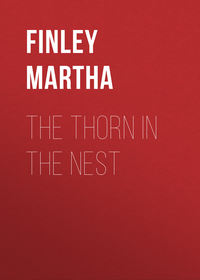
Mildred's New Daughter
They could not afford to keep a servant, and most of the house-work as well as the cooking fell to her share; Ethel and Carry devoting themselves to making articles for sale in the store and waiting upon customers.
Harry and Nannette too made themselves very useful out of school hours, doing errands and helping with the work about the house.
But Ethel did more than anyone else, so anxious was she to succeed in paying her way and making a living for them all. She was cheerful and happy, but greatly overworked; always very glad of the Sabbath rest, as they all were indeed, but eager to begin her labors again on Monday morning.
There was no one to watch over and warn her of the danger of overtasking her strength. Her uncles were so displeased that she was so determined to earn her own living and that of her younger brother and sisters, that they would not visit or assist her in any way, and naturally it was the same with their wives and children.
They saw nothing of each other on the Sabbath, Ethel choosing to attend a nearer church of the same denomination. They were all regular attendants upon the church services and at Bible-class and Sunday-school. Ethel and Blanche were in the same class and soon became greatly attached to their teacher, Miss Seldon, a lovely Christian woman who was deeply interested in all her scholars, but especially in this little family of orphans, struggling so hard to make their own way in the world. It soon became no unusual thing for her to call at their humble little home, invite their confidence, and, being a woman of means, in the kindest and most delicate manner render them assistance when she discovered that they were in any financial difficulty. But of that Ethel, in her pride of independence, would accept very little.
Miss Seldon did not know how hard and constantly the young girl worked, therefore did not warn her, as she certainly would had she known.
So things went on for nearly a year – all working industriously, but Ethel bearing the heaviest end of the burden, both physical and mental; for it was she who must plan how to meet all necessary payments. Often on waking in the morning she found it required a great effort to rise, dress, and resume her daily duties, and at last there came a time when the effort to do so was utterly vain; she could scarcely stir, and to rise from her couch was an impossibility.
She called to Blanche, and with her assistance finally succeeded in getting into her clothes and crawling downstairs to the store. Her breakfast was brought to her there, and having eaten it she took up her needlework, but it required a great exertion of will-power to do even that, while to run the sewing-machine was impossible.
“Oh, what ails me? what shall I do?” she exclaimed at length, dropping the work into her lap and clasping her hands together with a gesture of despair.
“You have been working too hard and constantly,” said Carry, “and will just have to take a rest.”
“I can’t; there’s too much to do,” groaned Ethel.
“You’ll have to have a doctor,” said Blanche, her eyes full of tears. “But you must; you shall,” in reply to Ethel’s mournful, dissenting shake of the head. “I’ll go this minute for that one round the corner – Dr. Jones; I’ve heard people say he’s a good one.”
“We can’t afford it,” sighed Ethel.
“We certainly can’t afford to let you die, or break down so that you can’t do anything; so I’m going for him now, this minute,” returned Blanche, snatching up her hat and putting it on as she went.
She was so fortunate as to find the doctor in and was back again in a very few minutes, bringing him with her. After examining and cross-questioning his patient, he pronounced the trouble utter exhaustion from overwork, and ordered entire rest for weeks to come. She must go at once to her bed and stay there, refraining from any exertion of mind or body.
He was very kind and sympathetic, half carried her up to her room himself, and saw her comfortably established there; then repeating his order to her to refrain from every kind of exertion of body or mind, and promising to call again the following day, he left her.
“Is there much the matter, doctor?” asked Carry, as he passed through the store on his way out.
“She is utterly worn out,” was the reply. “With absolute rest she may, and I hope will, recover completely in time; but it is very important that she should be relieved from all care and anxiety.”
“I don’t see how we are to manage that,” sighed Carry to herself, as he passed out, and she said the same thing to Blanche when she came into the room a few moments later.
“I don’t know either,” returned Blanche, tears filling her eyes, “unless – unless my uncles will help us a little.”
“I’d go to see them and tell them all about it, if I were you,” said Carry.
“To be sure; that’s just what I will do,” exclaimed Blanche, brightening. “I’ve got to do some errands out anyway, and, after attending to them, I’ll go right on to my uncles’ store and tell – ‘my tale of woe,’” she concluded with a vain attempt at mirthfulness.
With that she ran up to her room and hastened to attire herself neatly for her errand. She had left Ethel in bed and alone, the physician having enjoined it upon her to go to sleep as speedily and soundly as possible.
Blanche found her uncles in their office. They looked somewhat surprised at sight of her, but greeted her kindly, asking if she and her brother and sisters were all well.
At that Blanche burst into tears and sobbed hysterically for a moment.
“What is it, dear child?” asked her Uncle Albert, taking her hand and drawing her to a seat upon his knee. “I fear you are having a hard time of it, trying to support yourselves. Is some one of you ill?”
“Yes, sir; Ethel – Ethel has – has broken down,” sobbed the little girl. “Oh, uncle, I’m so afraid she’ll die! The doctor says she’s all worn out; for she has just worked, and worked, and worked from early in the morning till late at night every day but Sunday; and she can’t get out of her bed now – and – and oh, I don’t know what we will do, for she’s the head one that directs all the rest of us.”
“Ah, she should not be so wilful,” remarked Mr. George Eldon grimly. “However, you needn’t fret, child; of course we, your uncles, will see that you do not come to want; that you are provided with all necessary things.”
“Of course we will,” said Uncle Albert, “and Ethel must do as the doctor advises – not exert herself in the least till he pronounces her entirely recovered. I will go back with you, Blanche, see Ethel, and do what lies in my power to make her easy in body and mind. And you may feel sure that none of you will be allowed to want for anything your uncles can supply.”
“Yes, that will be well,” said his brother, “and tell Ethel from me that I shall be round to see her before long, probably either this evening or to-morrow morning. But she is not to stay awake expecting me,” he added with a slight smile. “Come here, Blanche, and give your old uncle a kiss before you go. There,” putting an arm about her as she stood at his side, and kissing her affectionately, “don’t fret, little girl, while you have two uncles able and willing to provide you and the others with whatever may be needful to make you comfortable.”
At that moment his son George coming in exclaimed: “Why, is this you, Blanche? I have not seen you for months; and how you have grown, child!” and he bent down and kissed her cheek. “Why, you have been crying! Is anything wrong with you or the others?” he asked. “I hope not, I am sure. I was thinking only this morning that I must hunt you up and see how you were getting along.”
“Thank you, Cousin George,” returned the little girl in tremulous tones; “we were doing right nicely till – till now that Ethel has broken down because – the doctor says it is because she’s been working too constantly and hard.”
“Ah! why, she shouldn’t do that when we’re all able and willing to help her. But don’t fret, little coz; she’ll probably be all right in a few days, and we’ll tell her she must not work so hard any more.”
“You’re very kind, Cousin George,” returned Blanche, smiling through her tears, “and so are my uncles, but we don’t like to be a burden to them when they have so many children of their own to provide for, and it has seemed very pleasant for us to be all together in a little home of our own, even though it is very plain and humble.”
“Well, yes, that’s a very right sort of feeling,” he said, “and makes one all the more willing to help you.”
“There, that must do for the present, George,” said his father. “You can call round to see Ethel and the rest any time after business hours, but your uncle is going to take Blanche home now and see what is needed. Good-by, child,” taking her hand for a moment and giving her a parting caress, “and don’t ever be afraid to come to your Uncle George for help when you are in trouble.”
“Good-by and thank you, uncle. Good-by, Cousin George, and do come to see us,” she said, and slipping her hand into that of her Uncle Albert, they went out together.
Ethel had just waked from a comfortable nap when Blanche returned bringing their Uncle Albert with her.
The interview was a pleasant one, for Mr. Eldon was very kind, sympathetic and appreciative of the efforts his young niece had put forth in order to earn a living for herself and her sisters and brother; he praised her for it, yet added: “But now you see, Ethel, that you are too young and feeble for so great an undertaking. However,” noting with concern the cloud of care and disappointment his words called to her tell-tale countenance, “we will not talk any more of that to-day. Try, my dear child, just to dismiss all vexing thoughts; trust to your uncles to ward off from you, your brother, and sisters, all danger from want of means, and with a mind at ease get well and strong again as soon as possible. When you have accomplished that it will be time enough to think of those other matters.”
“You are very, very kind, uncle,” she returned with tears shining in her eyes. “I will try to put away anxious and vexing thoughts and trust in you – but still more in the Lord – till I’m able to work again.”
“Only till you are able to work again?” he said with a slight smile. “Really I fear my niece Ethel has some obstinacy in her nature; yet that is not altogether a bad thing; it is much to be preferred to vacillation, I think; yet young people should be willing to be guided and controlled to some extent at least by older ones who have claims to their respect and obedience.”
“Yes, sir, I acknowledge that,” she said with a slight sigh, “and I intend to try to obey you and Uncle George in all that I can.”
“That is right,” he responded with a pleased look, “and remember you have no need to be troubled with anxious cares, for your Uncle George and I will see that you and the rest are provided with all necessary things. Now I will leave you to take another nap. Good-by, dear child,” giving her a parting kiss; “I shall be in again in a day or two to see how you are getting along. Now, Blanche,” as he and his younger niece left the room together, “show me about the house and let me see how comfortable you have managed to make yourselves.”
Blanche obeyed very willingly, for she was right proud of Ethel’s success in making so good and comfortable a home for them all, and Uncle Albert noted and commended all that was worthy of it, and made no remarks about the defects that he perceived. He said truly that he thought they had done wonders, while at the same time he mentally resolved that if they persisted in staying there, many a comfort and convenience should be added to their slender store.
In taking leave he put some money into Blanche’s hand, bidding her see that Ethel was well fed, for he was sure she needed nourishing food and rest more than anything else.
“Oh, uncle, thank you!” Blanche exclaimed, her eyes sparkling with delight. “Yes, indeed, I’m sure she does, and I’ll see that she has it.”
At that moment Nannette came rushing in through the store, Harry following.
“Oh, Uncle Albert!” they cried at sight of him, Nannette springing forward and holding up her face for a kiss, adding, “It’s such a long while that I haven’t seen you, and I’m so glad you’ve come to see us at last.”
“Ah, little one! I thought you had forgotten all about Uncle Albert,” he returned, giving the caress with hearty good will. “But how you have grown! Harry also,” shaking the boy’s hand heartily. “Well, I am just going, but I hope we will see each other oftener in the future.”
With that he was hastening toward the outer door, when seemingly struck by a second thought he turned toward them again, saying: “Harry, my boy, put down your satchel of books and come with me. I want you to act as my errand boy for once in a way.”
“Do you, uncle? Oh, I’d like to,” cried the boy, hastening to obey.
“It strikes me that you are growing out of your clothes, laddie,” his uncle remarked, with a scrutinizing glance down at Harry as they walked briskly along the street.
“Yes, sir,” Harry returned, blushing, “I can’t help growing fast, and of course Ethel can’t make enough money to be always buying new clothes for me. But I can stand it,” he added cheerfully, “and I hope one of these days I’ll be able to make enough to dress myself and all my sisters, too.”
“Great expectations, my boy,” his uncle said with a smile; “but if you make use of all your advantages I dare say they may be realized some day. And by the way, Harry, if you do make yourself fit for the place, I’ll take you into the store one of these days, should you happen to fancy the business.”
“Oh, uncle, will you?” cried the boy. “I’d like it so much, and I’ll try my very best to qualify myself for it.”
While this conversation was going on between Mr. Eldon and Harry, Blanche was giving Nannette a detailed account of the doings of that afternoon – her calling in of the doctor, the visit she had afterward paid to her uncles at their place of business and their Uncle Albert’s call upon them, his talk with Ethel and then with herself as she conducted him over the house. Nannette listened to it all with intense interest, then, after a moment’s silence, burst out:
“It’s just too bad that Uncle Albert doesn’t know how Ethel and I were always treated by his daughters – as if we weren’t their equals; if he did he wouldn’t blame Ethel for trying to make a home for us and herself. But she couldn’t tell him, of course.”
“No, no, indeed! I’m sure neither Ethel nor any of the rest of us would be willing to give him the pain of knowing about it; yet it does seem right hard that for that reason we can’t show him the reasonableness of our desire for a home of our very own.”
“Yes,” sighed Nannette, “it does seem hard, because it looks as if we were ungrateful to him for all his kindness; but maybe some day they’ll feel sorry for treating us so and tell him of it themselves.”
“I hope so,” said Blanche, but her tone and the accompanying sigh seemed to indicate that the hope was but faint.
“I think I’ll go up now to see Ethel,” said Nannette. “I hope she’s feeling better for uncle’s visit.”
“Yes, so do I,” returned Blanche; “but I wouldn’t go up just yet, she may be asleep; besides it’s time for us to be getting supper. You’ll set the table, won’t you, while I make the toast and tea?”
“Yes, indeed,” answered Nannette cheerfully, and they set to work.
Just as everything was ready for the meal, Harry came rushing in with a joyful little shout.
“Hello, girls! look at me!” and he danced about the kitchen, clapping his hands and acting like one fairly wild with delight. His sisters looked up and uttered simultaneous exclamations of surprise and delight.
“O Harry, how fine – how nice you look! Why, where did you get that new suit?”
“It’s a present from Uncle Albert!” exclaimed the boy half breathlessly, “coat and pants; and aren’t they splendid? And this isn’t all; he’s given me a handsomer suit than this for Sunday. Oh, but he’s a brick! now isn’t he? And see what he’s bought for Ethel and the rest of us,” he added, stepping to the door and bringing in a good-sized basket. “I didn’t show it at first, because I wanted your undivided attention given to my clothes.”
“Oh! oh! such elegant grapes and peaches and pears!” cried Nannette, peeping into the basket; “and – and what’s that at the bottom?”
“Why, what do you think?” laughed Harry.
“We’ll have to take it out of the basket and the paper it’s wrapped in, before we can tell,” replied Blanche, proceeding to lift out the fruit and place it carefully on a large dish. “Oh, birds picked and cleaned all ready for the gridiron! They must be for Ethel; and how good of uncle to buy them for her.”
“He said they were for all of us,” returned Harry, “that there would be enough for each of us to have one, and leave one for Ethel’s breakfast; and to-morrow he’s going to send us some more or something else quite as good.”
“He’s just as kind as he can be!” was Nannette’s rejoinder, Blanche adding, “Indeed he is! I do love him and wish everybody had as good and kind an uncle.”
“Some folks have fathers, and I suppose they do just as well as uncles,” laughed Harry.
CHAPTER XVIII
“You have been gone a good while, Albert; I hope it was not because of finding the child ill?” Mr. George Eldon remarked enquiringly when his brother re-entered their office.
“She is worn out and a long rest will be very necessary, I think,” was the reply in an anxious tone, “and I for one shall do what I can to make her take it. She is certainly a bright girl and one to be proud of, George. There are none too many who would exert themselves as she has done when they might live at ease, depending on relatives able and willing to care for them.”
“No, I dare say not, but I have sometimes felt that I should prefer to have her a trifle less independent. But,” glancing at the clock, “sit down and give me an account of your visit, and the state in which you found her and the others. I see we have time enough for a chat before starting for home.”
The request was complied with, a consultation held as to how much, and in what way Ethel and the others should be assisted, then, still conversing together on the subject, the brothers started for their homes.
It was the topic of conversation at the dinner table at Mr. George Eldon’s that evening, and Dorothy and the two young men seemed much interested.
“She is a brave, industrious little woman,” said George. “I doubt if there are many girls who would have voluntarily undertaken all that she has.”
“There are certainly a great many who wouldn’t,” said William, “and I own that I am more proud of her than of my very dressy, fashionable cousins next door.”
“Or of the one sitting here, I presume,” laughed Dorothy. “I don’t blame you, Will; but perhaps I might try going into business too if your mother did not insist that she needs me here.”
“Of course she does, and so do we,” said her uncle. “There must be somebody to sew on buttons and strings and attend to various other small matters affecting our comfort.”
“And certainly Dorothy deserves the credit of attending faithfully to those small but necessary matters,” said George.
“That’s true,” said his brother, “and of making quantities of garments for other people besides. She’s a regular Dorcas, as I’ve heard mother say more than once.”
“Be careful, young men, or you’ll have me so puffed up there’ll be no living in the same house with me,” returned Dorothy with merry look and tone, “and then who’ll sew on your buttons and strings?”
“We’ll carry them to mother,” replied William with gravity. “She can’t go round the house and hunt things up, but we will do that part, and she’ll be both able and willing to tack the things on for us.”
“And you, of course, are not likely to tire of your part of the work,” returned Dorothy, “nor ever to forget to hunt up the garments and carry them to aunt in good season to have them got ready for wear when wanted. I should really like to see that poor girl – Ethel,” she continued presently. “I wonder if she would care to see me.”
“I am going round there this evening – in about an hour from now,” said her uncle. “Would you like to go with me?”
“Yes, sir; yes, indeed, if I may.”
“I shall be pleased to have you,” he returned, “as I am partial to ladies’ society and your aunt cannot go with me.”
“Have you told mother of Ethel’s break-down, sir?” asked his son George.
“Not yet, but I am going up to do so now,” Mr. Eldon replied, as they all rose from the table.
Mrs. Eldon heard the story with interest, her husband recounting to her all that his brother had told him of the little home Ethel had made for herself and the younger ones, its comforts and conveniences, and what was lacking in that line; also how completely she had overworked herself in her determined effort to provide for her little family.
“Now what can we do to help her?” she asked when he had finished. “She is worthy of help, for she has shown herself wonderfully brave, self-reliant, and industrious.”
“She has indeed,” he responded, “and must be prevented from beginning work too soon. I am going to warn her to be careful, assuring her that Albert and I will provide all that is necessary, at least until she has fully recovered her health, and strength; and I shall insist that she allows us to do so. Her father would certainly have done the same by my children had the situation be reversed; and so I shall tell her.”
“Yes; and lest she should doubt my willingness to have you do so, tell her I think it no more than one brother should do for the children of another, if he finds himself as able as you are.”
“Thank you, my dear. And now I will go at once that I may get back to you the sooner.”
He found Dorothy ready, waiting for him in the parlor below, and they set off at once.
They were joyfully welcomed on their arrival at their destination. Ethel was surprised and touched at this evidence of feeling for her on the part of her Uncle George and Dorothy. They found her awake, talked very kindly to her, showing much interest in her and the younger ones, but, perceiving that her greatest need was rest and sleep, left early, promising to come again soon. Her uncle bade her an affectionate good-by, telling her not to fret or worry about anything, but to take matters easily, trusting in Providence, and her uncles as His instruments. He took her hand as he spoke and left something in it, which on examination she found to be a five-dollar bill.
“How good in him!” she murmured; glad, grateful tears chasing each other down her cheeks.
“Uncle,” said Dorothy, as they walked along together, “I think those children need some clothes; excepting Harry, perhaps. Did you notice what a neat, new suit he had on?”
“Yes; it was a present this afternoon from his Uncle Albert. It would be no more than my share to provide for the girls whatever may be needed.”
“Well, uncle, if you’ll furnish the money I’ll do the work. Aunt and I have been working for the Dorcas society – helping to clothe the poor – and it really seems to me that the needy ones of our own family have the very first claim.”
“That is my view of the matter,” he said, “and I am ready to pay for all the material you and your aunt may think it best to buy and make up for them.”
“Oh, thank you, sir! Shall we not have a talk with aunt about it when we get home?”
“Certainly. She will be apt to know just what should be bought, and, if you like, you can do the buying to-morrow. I will furnish the funds.”
On reaching home they went directly to Mrs. Eldon’s room, gave a detailed account of their visit and the discoveries made regarding the needs of Ethel and the others, then of their plan for affording relief, of which Mrs. Eldon highly approved, and which she and Dorothy began carrying out the next morning.
The result was a joyful surprise to the three girls and a lightening of Ethel’s burden of care which greatly assisted her recovery. She strove, and with some measure of success, not to think of business cares and anxieties for some days, but as soon as she was able to be up and at work again, she proposed to her partner that they should go over their books, take an inventory of goods on hand, and find out exactly how they stood with their creditors. They did so and discovered to their dismay that, so far from having made anything, they were in debt.









